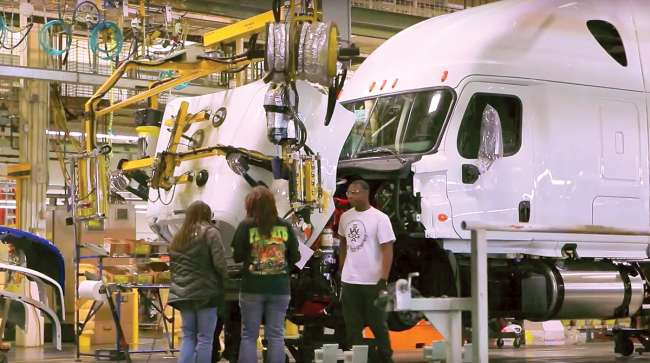Staff Reporter
DTNA, UAW Ink Tentative Labor Deal for Freightliner Plants

[Stay on top of transportation news: Get TTNews in your inbox.]
Daimler Truck North America inked a tentative four-year labor agreement with the United Auto Workers union covering about 7,400 staff April 26, hours before the prior deal at Freightliner manufacturing facilities in the U.S. was set to expire.
The 11th-hour collective bargaining agreement deal covers unionized staff at DTNA’s Cleveland Truck Manufacturing Plant, Mount Holly Truck Manufacturing Plant and Gastonia Parts Plant, all in North Carolina; the Atlanta Parts Distribution Center; Memphis Parts Distribution Center; and the Thomas Built Buses facility in High Point, N.C.
Cleveland Truck is Freightliner’s largest U.S. manufacturing plant, while Mount Holly produces Freightliner’s medium-duty models. The Gastonia facility carries out stamping, metal fabrication and sub-assembly of cab and chassis parts, according to DTNA. Freightliner sells more Class 8 trucks in the U.S. than any other brand.
Negotiations began on language specific to each location Feb. 19, talks on common language to the agreement commenced April 2, and health and safety negotiations began April 8, according to UAW Local 5285, which represents Mount Holly employees.
Whether they work on @freightlinertrucks or @demanddetroit, @westernstartrucks or @thomasbuiltbuses, we owe it all to our DTNA employees who keep the world moving every day. #ForThoseWhoKeepTheWorldMoving pic.twitter.com/mSegvpJ7E4 — Daimler Truck NA (@DaimlerTruckNA) November 14, 2023
As the deadline approached, DTNA remained positive, with a spokeswoman telling Transport Topics on April 24 in an email: “We are currently engaged in good faith CBA negotiations with our UAW partners for a new contract that will benefit all parties and allow [DTNA] to continue delivering the products that enable our customers to keep the world moving.”
UAW members at the six locations will now vote on the new contracts. A timeline has yet to be released.
After a fall and spring of successes in negotiations with truck and passenger car manufacturers, the UAW negotiating team settled relatively early in the process with DTNA, and the union expressed pride in the deal April 27.
“Last night, our UAW Daimler Bargaining Team came to a tentative agreement with the company that includes historic gains for Daimler workers, including raises of more than 25%, the end of wage tiers, and the introduction of profit-sharing and [a Cost-of-Living Agreement], and no concessions,” the union said in a statement.
In an April 26 speech, UAW President Shawn Fain said it was the first COLA at DTNA.
VICTORY! WHAT WE WON AT DAIMLER. pic.twitter.com/f7z5BZL9BD — UAW (@UAW) April 27, 2024
“For months, we said that record profits should mean a record contract. And, UAW family, our determination and solidarity has delivered,” Fain said during the speech in Charlotte, N.C. “We said: It shouldn’t matter if you build a heavy truck or a bus for Daimler, you should get paid the same for the same work. And we won equal pay for equal work, ending wage tiers at Daimler.”
He added, “All Daimler workers will receive a minimum of a 25% general wage increase over the next four years. When this deal is ratified, you’ll get a 10% raise. Six months later, another 3%. Six months after that, another 3%. That’s a 16% raise in the first year of the deal, alone.

Fain
“All told, this deal is worth dramatically more than any past Daimler contract. So, when we say record profits mean record contracts, we mean it.”
DTNA parent company Daimler Truck reports first-quarter 2024 earnings May 7. Profits at Daimler Truck jumped 120% year-over-year in the fourth quarter of 2023 to $1.322 billion on strong demand plus higher prices and margins, the company said March 1.
While a tentative deal was struck prior to the old contract expiring, the company and union are aware of UAW members’ track record across the truck industry in recent months, with initial agreements rejected at Volvo Group’s Mack Trucks and Allison Transmission Holdings.
Check out Transport Topics' updated Top 100 list of the largest logistics companies in North America, and explore how the industry's top players have adapted to a tough freight market and are preparing for the future. Tune in above or by going to RoadSigns.ttnews.com.
Fain noted this in his April 26 speech.
“And while we celebrate today, our membership is the highest authority in our union, and they will have the final say,” he said. “In the coming days and weeks, we will hold local roll-out meetings so that our members can hear everything we won in this deal and vote on whether this agreement properly addresses their demands.”
Mack Trucks’ UAW members on Oct. 8 rejected an Oct. 1 tentative agreement with the union. However, a five-year deal unchanged from the tentative agreement was ratified by the 3,900 employees Nov. 15 after a six-week work stoppage. Mack Trucks’ showdown with the UAW cost it just more than 1,800 Class 8 vehicles, according to S&P Global Mobility estimates.
Meanwhile, 1,500 workers at Allison ratified a four-year deal Jan. 16 after the automated transmission specialist and UAW Local 933 reached a tentative agreement Jan. 5. It was the second time the two sides had reached a tentative deal; about 96% of workers rejected an earlier agreement the day before Thanksgiving. However, members of the union remained on the job while talks continued.
Signing bonuses linked to the labor contract hurt Q1 profits at Allison, the company said April 25, even as the company posted record sales on the back of U.S. Class 8 vocational truck demand.
Indianapolis-based Allison posted net income for the quarter of $169 million, down from $170 million, due to a $14 million one-time hit from the signing bonuses.
Want more news? Listen to today's daily briefing above or go here for more info
Earlier successes at passenger car manufacturers emboldened UAW negotiators and members as trucking industry collective bargaining agreements wound down.
The union took on the three powerhouse Detroit automakers at the same time and achieved its goals. In November, a six-week strike at General Motors ended. GM took a $1.1 billion earnings hit due to the strike.
UAW terms with GM were broadly similar to deals with Ford Motor Co. and Stellantis NV, including a 25% hourly pay raise. A six-week strike at Ford cut sales by around 100,000 vehicles and cost it $1.7 billion in profits, the company said Nov. 30.





